汉译英[1]
- 格式:doc
- 大小:118.00 KB
- 文档页数:10
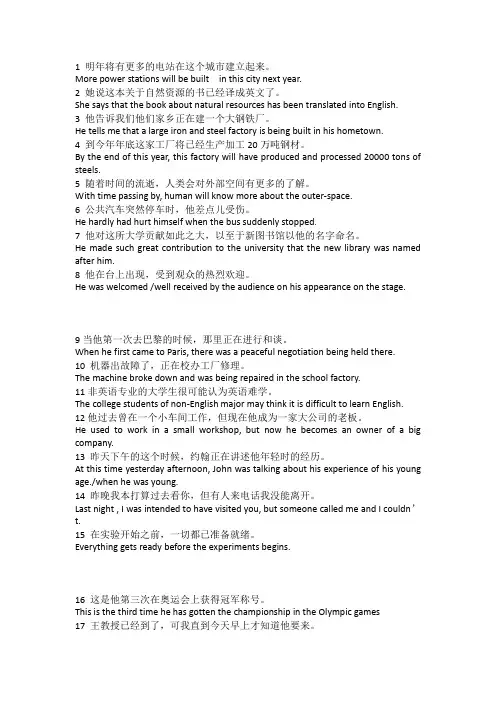
1 明年将有更多的电站在这个城市建立起来。
More power stations will be built in this city next year.2 她说这本关于自然资源的书已经译成英文了。
She says that the book about natural resources has been translated into English.3 他告诉我们他们家乡正在建一个大钢铁厂。
He tells me that a large iron and steel factory is being built in his hometown.4 到今年年底这家工厂将已经生产加工20万吨钢材。
By the end of this year, this factory will have produced and processed 20000 tons of steels.5 随着时间的流逝,人类会对外部空间有更多的了解。
With time passing by, human will know more about the outer-space.6 公共汽车突然停车时,他差点儿受伤。
He hardly had hurt himself when the bus suddenly stopped.7 他对这所大学贡献如此之大,以至于新图书馆以他的名字命名。
He made such great contribution to the university that the new library was named after him.8 他在台上出现,受到观众的热烈欢迎。
He was welcomed /well received by the audience on his appearance on the stage.9当他第一次去巴黎的时候,那里正在进行和谈。
When he first came to Paris, there was a peaceful negotiation being held there.10 机器出故障了,正在校办工厂修理。

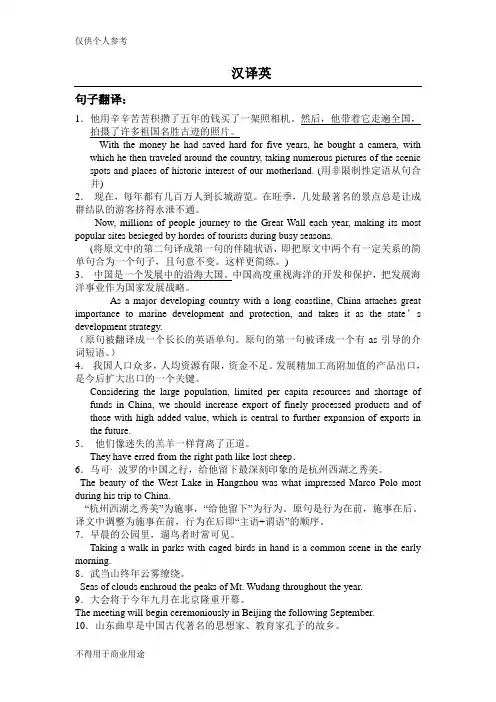
汉译英句子翻译:1.他用辛辛苦苦积攒了五年的钱买了一架照相机。
然后,他带着它走遍全国,拍摄了许多祖国名胜古迹的照片。
With the money he had saved hard for five years, he bought a camera, with which he then traveled around the country, taking numerous pictures of the scenic spots and places of historic interest of our motherland. (用非限制性定语从句合并)2.现在,每年都有几百万人到长城游览。
在旺季,几处最著名的景点总是让成群结队的游客挤得水泄不通。
Now, millions of people journey to the Great Wall each year, making its most popular sites besieged by hordes of tourists during busy seasons.(将原文中的第二句译成第一句的伴随状语,即把原文中两个有一定关系的简单句合为一个句子,且句意不变。
这样更简练。
)3.中国是一个发展中的沿海大国。
中国高度重视海洋的开发和保护,把发展海洋事业作为国家发展战略。
As a major developing country with a long coastline, China attaches great importance to marine development and protection, and takes it as the state’s development strategy.(原句被翻译成一个长长的英语单句。
原句的第一句被译成一个有as引导的介词短语。
)4.我国人口众多,人均资源有限,资金不足。
发展精加工高附加值的产品出口,是今后扩大出口的一个关键。
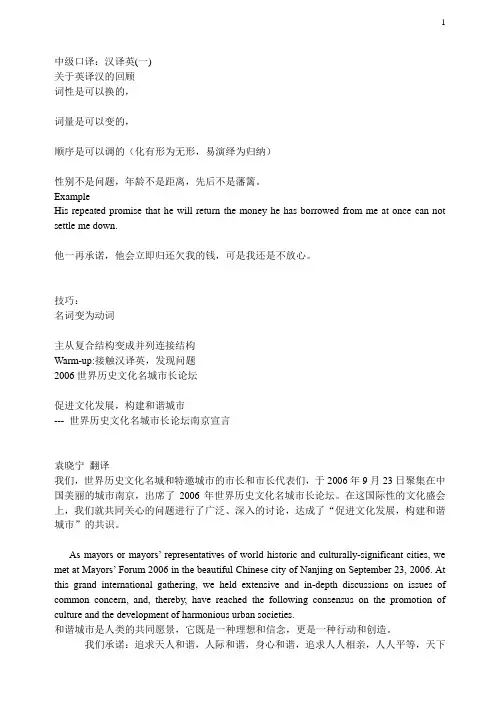
1中级口译:汉译英(一)关于英译汉的回顾词性是可以换的,词量是可以变的,顺序是可以调的(化有形为无形,易演绎为归纳)性别不是问题,年龄不是距离,先后不是藩篱。
ExampleHis repeated promise that he will return the money he has borrowed from me at once can not settle me down.他一再承诺,他会立即归还欠我的钱,可是我还是不放心。
技巧:名词变为动词主从复合结构变成并列连接结构Warm-up:接触汉译英,发现问题2006世界历史文化名城市长论坛促进文化发展,构建和谐城市--- 世界历史文化名城市长论坛南京宣言袁晓宁翻译我们,世界历史文化名城和特邀城市的市长和市长代表们,于2006年9月23日聚集在中国美丽的城市南京,出席了2006年世界历史文化名城市长论坛。
在这国际性的文化盛会上,我们就共同关心的问题进行了广泛、深入的讨论,达成了“促进文化发展,构建和谐城市”的共识。
As mayors or mayors’ representatives o f world historic and culturally-significant cities, we met at Mayors’ Forum 2006 in the beautiful Chinese city of Nanjing on September 23, 2006. At this grand international gathering, we held extensive and in-depth discussions on issues of common concern, and, thereby, have reached the following consensus on the promotion of culture and the development of harmonious urban societies.和谐城市是人类的共同愿景,它既是一种理想和信念,更是一种行动和创造。
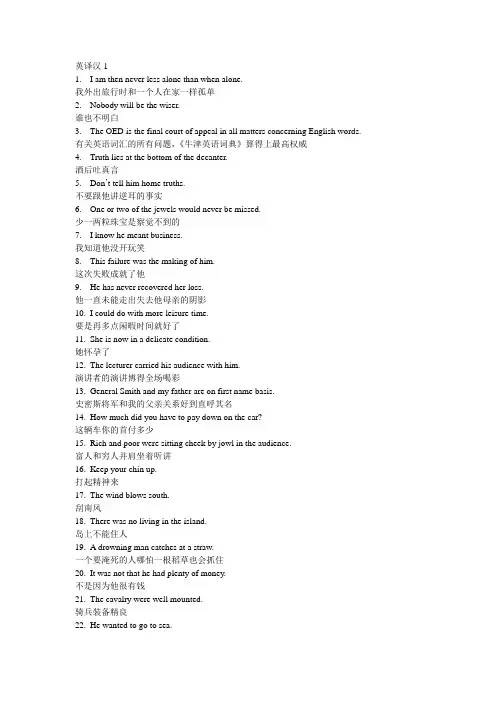
1.I am then never less alone than when alone.我外出旅行时和一个人在家一样孤单2.Nobody will be the wiser.谁也不明白3.The OED is the final court of appeal in all matters concerning English words. 有关英语词汇的所有问题,《牛津英语词典》算得上最高权威4.Truth lies at the bottom of the decanter.酒后吐真言5.Don’t tell him home truths.不要跟他讲逆耳的事实6.One or two of the jewels would never be missed.少一两粒珠宝是察觉不到的7.I know he meant business.我知道他没开玩笑8.This failure was the making of him.这次失败成就了他9.He has never recovered her loss.他一直未能走出失去他母亲的阴影10.I could do with more leisure time.要是再多点闲暇时间就好了11.She is now in a delicate condition.她怀孕了12.The lecturer carried his audience with him.演讲者的演讲博得全场喝彩13.General Smith and my father are on first name basis.史密斯将军和我的父亲关系好到直呼其名14.How much did you have to pay down on the car?这辆车你的首付多少15.Rich and poor were sitting cheek by jowl in the audience.富人和穷人并肩坐着听讲16.Keep your chin up.打起精神来17.The wind blows south.刮南风18.There was no living in the island.岛上不能住人19.A drowning man catches at a straw.一个要淹死的人哪怕一根稻草也会抓住20.It was not that he had plenty of money.不是因为他很有钱21.The cavalry were well mounted.骑兵装备精良22.He wanted to go to sea.23.She is careless of her dress.她不爱惜衣服24.None is so deaf as those that won’t hear.没有人比不想听的人更聋了25.You must make good any loss.有任何损失你都得赔偿26.Those apples are good and ripe.那些苹果熟透了27.The smoke betrayed where the dwelling lay.炊烟起处有人家28.Curses come home to roost.害人终害己29.He is brave like anything.他其勇无比30.It is said that his days are numbered.据说他快死了31.He was lost in admiration.他不胜赞赏(其实就是人家赞赏时,他自己云里雾里的。
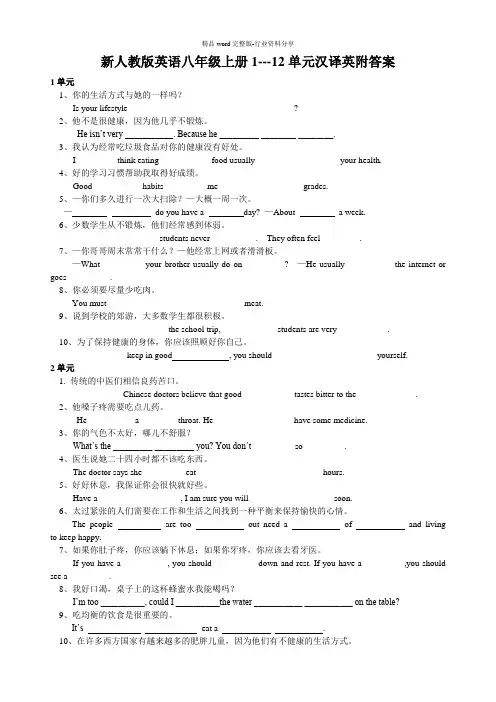
新人教版英语八年级上册1---12单元汉译英附答案1单元1、你的生活方式与她的一样吗?Is your lifestyle _________ _________ _________ _________?2、他不是很健康,因为他几乎不锻炼。
He isn’t very ___________. Because he _________ ________ ________.3、我认为经常吃垃圾食品对你的健康没有好处。
I _________think eating ___________ food usually _________ _________ your health.4、好的学习习惯帮助我取得好成绩。
Good ___________habits _________ me _________ _________ grades.5、—你们多久进行一次大扫除?—大概一周一次。
—do you have a day? —About a week.6、少数学生从不锻炼,他们经常感到体弱。
__________ _________ students never __________. They often feel ________ .7、—你哥哥周末常常干什么?—他经常上网或者滑滑板。
—What _________ your brother usually do on _________? —He usually __________ the internet or goes _________ .8、你必须要尽量少吃肉。
You must _______ _______ _______ ________ meat.9、说到学校的郊游,大多数学生都很积极。
___________ __________ the school trip, ____________ students are very ___________.10、为了保持健康的身体,你应该照顾好你自己。
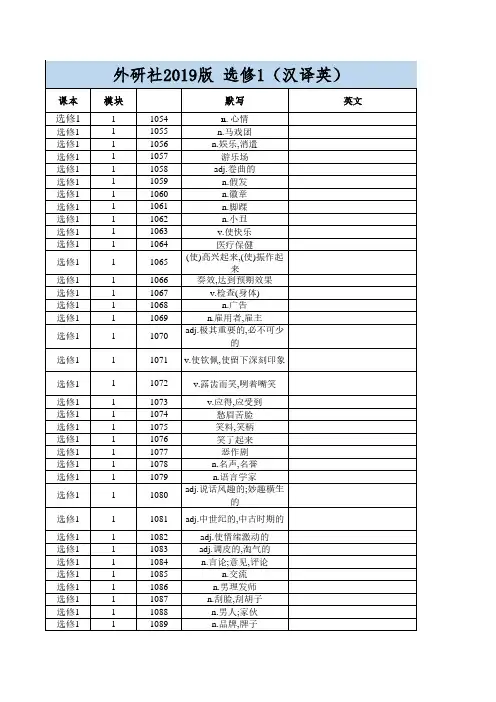
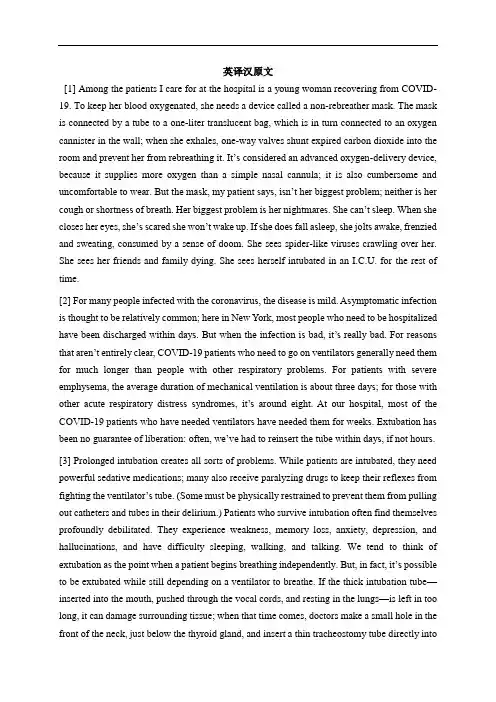
英译汉原文[1] Among the patients I care for at the hospital is a young woman recovering from COVID-19. To keep her blood oxygenated, she needs a device called a non-rebreather mask. The mask is connected by a tube to a one-liter translucent bag, which is in turn connected to an oxygen cannister in the wall; when she exhales, one-way valves shunt expired carbon dioxide into the room and prevent her from rebreathing it. It’s considered an advanced oxygen-delivery device, because it supplies more oxygen than a simple nasal cannula; it is also cumbersome and uncomfortable to wear. But the mask, my patient says, isn’t her biggest problem; neither is her cough or shortness of breath. Her biggest problem is her nightmares. She can’t sleep. When she closes her eyes, s he’s scared she won’t wake up. If she does fall asleep, she jolts awake, frenzied and sweating, consumed by a sense of doom. She sees spider-like viruses crawling over her. She sees her friends and family dying. She sees herself intubated in an I.C.U. for the rest of time.[2] For many people infected with the coronavirus, the disease is mild. Asymptomatic infection is thought to be relatively common; here in New York, most people who need to be hospitalized have been discharged within days. But when the infection is bad, it’s really bad. For reasons that aren’t entirely clear, COVID-19 patients who need to go on ventilators generally need them for much longer than people with other respiratory problems. For patients with severe emphysema, the average duration of mechanical ventilation is about three days; for those with other acute respiratory distress syndromes, it’s around eight. At our hospital, most of the COVID-19 patients who have needed ventilators have needed them for weeks. Extubation has been no guarantee of liberation: often, we’ve had to reinsert the tube within days, if not hours.[3] Prolonged intubation creates all sorts of problems. While patients are intubated, they need powerful sedative medications; many also receive paralyzing drugs to keep their reflexes from fighting the ventilator’s tube. (Some must be physically restrained to prev ent them from pulling out catheters and tubes in their delirium.) Patients who survive intubation often find themselves profoundly debilitated. They experience weakness, memory loss, anxiety, depression, and hallucinations, and have difficulty sleeping, walking, and talking. We tend to think of extubation as the point when a patient begins breathing independently. But, in fact, it’s possible to be extubated while still depending on a ventilator to breathe. If the thick intubation tube—inserted into the mouth, pushed through the vocal cords, and resting in the lungs—is left in too long, it can damage surrounding tissue; when that time comes, doctors make a small hole in the front of the neck, just below the thyroid gland, and insert a thin tracheostomy tube directly intothe windpipe. This tube allows for a permanent connection to a ventilator. The patient has been extubated, but is no closer to his pre-coronavirus life.[4] The joy we all feel when patients at our hospital survive acute COVID-19 is followed, quickly, by the acknowledgment that it could be a long time before they fully recover, if they ever do. Many will suffer through months of rehabilitation in unfamiliar facilities, cared for by masked strangers, unable to receive friends or loved ones. Families who just weeks ago had been happy, healthy, and intact now face the prospect of prolonged separation. Many spouses and children will become caregivers, which comes with its own emotional and physical challenges. Roughly two-thirds of family caregivers show depressive symptoms after a loved one’s stay in the I.C.U. Many continue to struggle years later.[5] To contend with the flood of patients who will be extubated in the coming weeks, we’re planning to create a COVID-19 survivors unit. The unit will bring together clinicians from various backgrounds: hospitalists, pulmonologists, rehab specialists, psychiatrists, dieticians, therapists. It will develop COVID-19-specific protocols, which we hope will help patients progress to a fuller recovery. Patients will receive daily “pulmonary rehab”—a stepwise approach to reducing oxygen support and slowly building strength and endurance. They’ll learn breathing techniques and get help with gadgets they can use to clear mucus from the lungs. Some will be shown how to cough better. Physical and occupational therapists will help them recover motor skills that may have diminished during their hospitalizations; psychiatrists and nutritionists will help with mood and food. Many patients, because they are too sick, or need oxygen, or because no rehab facility will accept them, will need to spend days or weeks recovering in the hospital. The best thing we can do is create a home-like environment. The whole point is to help them stop being patients and start feeling human again.汉译英原文[1] 任何病毒感染性疾病,早期都会有病毒血症的表现。
![统考《大学英语B》英译汉专项练习[1]2](https://uimg.taocdn.com/bc58fa06b5daa58da0116c175f0e7cd1842518f5.webp)
统考《大学英语B》英译汉专项练习[1]2统考《大学英语B》英译汉专项练习1. I’m going to visit a friend of mine this Sunday.本周日我要去拜访一位朋友。
2. Stay here before I get back.在我回来之前别离开。
3. The shop is open till ten at night every day.商店每天营业到晚上十点。
4. Would you please help me with this heavy box?你能帮我抬一下这个很沉的箱子吗?5. It is certain that we shall produce this kind of engine.我们将生产这种发动机,这是肯定无疑的。
6. But competitive swimming is just over one hundred years old.但游泳比赛不过只有一百余年的历史。
7. One can never succeed without enough confidence in himself.一个人如果对自己没有足够的信心就不可能成功。
8. I’m now a distance education student.我现在是一名远程教育学员。
9. Think it over before you speak.先考虑一下再说。
10. When she left school, she went first to Britain.在她离开学校后,她首先去了英国。
11. I was too excited to say a word in front of him.我当时太兴奋了,以至于在他面前什么也说不出来了。
12. My problem is that I don’t have much time to do the work.我的问题在于我没有多少时间干这工作。
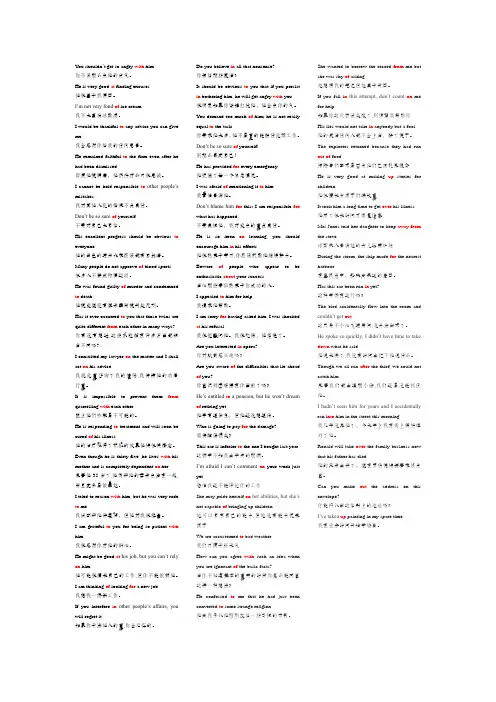
You shouldn’t get so angry with him.你不该那么生他的生气。
He is very good at finding excuses.他很善于找借口。
I’m not very fond of ice cream.我不太喜欢冰欺凌。
I would be thankful to any advice you can giveme.我会感谢你给我的任何忠告。
He remained faithful to the firm even after he had been dismissed.即使他被解雇,他仍然对公司很忠诚。
I cannot be held responsible to other people’s mistakes.我对其他人犯的错误不负责任。
Don’t be so sure of yourself.不要对自己太自信。
His excellent progress should be obvious toeveryone.他的出色的进步大家应该都有目共睹。
Many people do not approve of blood sports.很多人不赞成狩猎运动。
He was found guilty of murder and condemnedto death.他被发现犯有谋杀罪而被判处死刑。
Has it ever occurred to you that those twins arequite different from each other in many ways? 你有没有想过,这些双胞胎在许多方面都相当不同吗?I consulted my lawyer on the matter and I shallact on his advice.我就此事咨询了我的律师,我将按他的劝告行事。
It is impossible to prevent them fromquarrelling with each other.阻止他们吵架是不可能的。
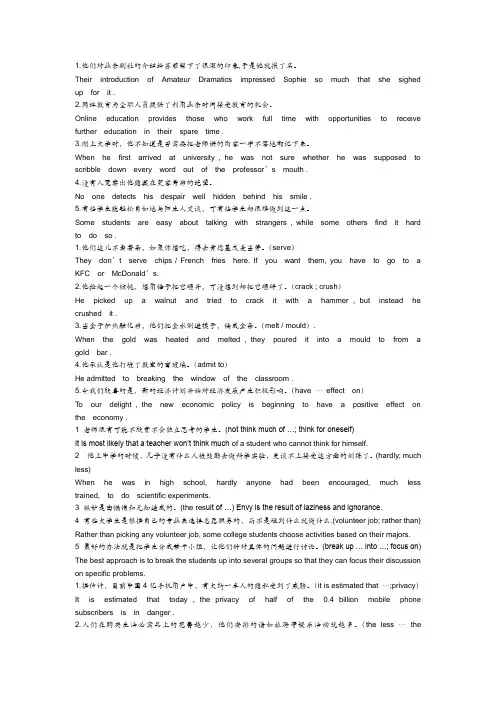
1.他们对业余剧社的介绍给苏菲留下了很深的印象,于是她就报了名。
Their introduction of Amateur Dramatics impressed Sophie so much that she sighed up for it .2.网络教育为全职人员提供了利用业余时间接受教育的机会。
Online education provides those who work full time with opportunities to receive further education in their spare time .3.刚上大学时,他不知道是否需要把老师讲的内容一字不落地都记下来。
When he first arrived at university , he was not sure whether he was supposed to scribble down every word out of the professor’s mouth .4.没有人觉察出他隐藏在笑容背后的绝望。
No one detects his despair well hidden behind his smile .5.有些学生能轻松自如地与陌生人交谈,可有些学生却很难做到这一点。
Some students are easy about talking with strangers , while some others find it hard to do so .1.他们这儿不卖薯条,如果你想吃,得去肯德基或麦当劳。
(serve)They don’t serve chips / French fries here. If you want them, you have to go to a KFC or McDonald’s.2.他捡起一个核桃,想用锤子把它砸开,可没想到却把它砸碎了。
(crack ; crush)He picked up a walnut and tried to crack it with a hammer , but instead he crushed it .3.当金子加热融化后,他们把金水倒进模子,铸成金条。
(1)一架从昆明起飞的小飞机,载着我们,飞越群山,把我们送到了景洪。
A small plane from Kunming flew over the mountains and sent us to Jinghong(2)党的干部住寒冷的窑洞,吃简陋的饮食,靠微弱的灯光,长时间地工作着。
Party officials worked long hours on meager food, in cold caves and by dim lamps.(3)永远记住你(always remember you)真遗憾(that's too bad/it's a shame)小心台阶(mind the steps)我感到很痛(I feel great pain)亚洲四小龙(the Four Little Tigers of Asia)百里挑一(one in a thousand)干杯!要一饮而尽。
(Cheers! Bottoms up.)(4)我老公他看你下岗了,舍不得花钱,就自己跑到电影院买了两张票,今天晚上请我们两个人去看电影。
My husband has bought two film tickets for us tonight, because you’re laid off and have to cut your expenses.(5)约翰为人可靠,他既忠诚又办事公道。
John can be relied on. He eats no fish and plays the game.(6)华尔街是个残酷的地方。
(Wall Street is a dog-eat-dog place.)(7)翻译是把一种语言表达的意义用另一种语言传达出来,以达到沟通思想情感、传播文化知识、促进社会文明,特别是推动译语文化兴旺昌盛的目的。
Translation is an activity of reproducing in one language the ideas which have been expressed in another language. (8)翻译是跨语言(cross-linguistic),跨文化(cross-cultural),跨社会(cross-social)的交际活动。
九年级全册单词表Unit1textbook speedconversation partneraloud bornpronunciation bebornwith sentence abilitypatient createexpression braindiscover activesecret attentionlookup payattentionto grammar connectrepeat connect…withnote overnightpal reviewphysics knowledgechemistry lifelongmemorize wiselypattern fallinlovewith pronounce Annieincrease AlexanderGrahamBellUnit2 I think that mooncakes are delicious! mooncake deadlantern businessstranger punishrelative warnputon enduppound presentfolk warmthgoddess spreadwhoever foolsteal bookstorelay nobodylayout Macaodessert ChiangMaigarden WaterFestivaltradition Mid-AutumnFestival admire Mother’sDaytie Father’sDayhaunted Halloweenghost AChristmasCaroltrick Eastertreat StValentine’sDay spider ClaraChristmas SantaClauslie CharlesDickensnovel Scroogeeve JacobMarleyUnit 3 Could you please tell me where the restrooms are restroom mallstamp clerkbookstore cornerbeside politelypostcard requestpardon directionwashroom correctbathroom politenormally directrush speakersuggest whompassby impolitestaff addressgrape underground central parkinglot nearby course pardonme faithfully mail choiceeast quick fascinating Italian inexpensive Kevin uncrowded TimconvenientUnit 4 I used to beaf raid ofhumorou antsilent insecthelpful seldom fromtimetotime influence score absent background failinterview examination Asian boardingschool deal inperson dealwith exactly shyness pridedare takepridein crowd proudton beproudof private generalguard introduction require grandson European PaulaAfrican AlfredBritish Billyspeech Candypublic Jerryinpublic EmilyUnit5 What are the shirtschopsticks Germanycoin surfacefork material blouse trafficsilver postmanglass capcotton glovesteel international fair competitor environmental paintgrass itsleaf formproduce claywidely celebration beknownfor balloon process papercutting pack scissors product lively France fairytale nomatter historical local heat eventhough polishbrand complete avoid Korea handbag Switzerland mobile SanFranciscoeveryday Marcusboss PamUnit 6 When was it inventedheel bellscoop biscuit electricity cookiestyle nusicalproject instrument pleasure crispyzipper saltydaily sourhaveapoint bymistake website customerpioneer theOlympicslist Canadian mention divide accidental divideinto byaccident basketnearly popularityruler notonly…butalso boil lookuptoremain herosmell professional saint purposenational Berlintrade NBAtakeplace CBAdoubt ChelseaLanmon withoutdoubt Royfridge JayceCoziarlow JamieEllsworthsomebody JulieThompsontranslate WhitcombJudsonlock Rubyearthquake ThomasWatsonsudden GeorgeCrumallofasudden JamesNaismithUnit 7 Teenagers should be allowed to choose their own clothes. license regretsafety poemsmoke communitypart-time keep…awayfrompierce chanceearring makeone’sowndecisionflash educatetiny managecry societyfield getinthewayofhug supportlift enterbadly choicetalkback unitawful bedroomteen PicassoUnit 8 It must belong towhose mysterytruck receivepicnic historianrabbit leaderattend midsummervaluable medicalpink purpose anybody prevent happening energynoise position policeman burialwolf honor uneasy ancestor laboratory victory outdoors enemycoat period sleepy hard-working land Stonehenge alien pocket runafter Carlasuit JKRowling express Victor atthesametime Jeancircle PaulStoker BritainUnit 9 I like music that Iprefer sadness lyrics pain Australian reflect electronic moving suppose perform smooth lifetime spare pitydirector totalcase intotal inthatcase masterwar praisestick recallstickto wounddown painfuldialogue horrorending thriller documentary amazingdrama WorldWarIIplenty MenInBlackplentyof KungFuPandashut Titanicshutoff MarchofthePenguins superhero Spider-Man onceinawhile Carmenintelligent DanDervishsenseUnit10 You're supposed to shake hands.custom emptybow basickiss exchangegreet gooutofone’sway relaxed makefeelathome value teenagedropby granddaughter capital behaveafterall exceptnoon elbowmad graduallygetmad getusetoeffort suggestion makeaneffort somewherepassport Brazil clean…off Mexicochalk Cali blackboard Colombia northern Lausanne coast Norway season Mariaknock Katieeastern Satotakeoff Marieworth TeresaLopez manner MarcLeBlancUnit 11 Sad movies makerather lemon wouldrather uncomfortable drive weight drivesbcrazy/mad shoulder themore…themore goallately let…down befriendswithsb coach leaveout kick friendship kicksboff king behardonsb power besidesprime teammate minister courage primeminister ratherthan banker guyfame pullpale pulltogether queen reliefexamine nodnor agreement neithernor faultpalace disappoint wealth Bert tostartwith HollygreyUnit 12 Life is full of theunexpected bytheendof bythetime…fool backpack costume oversleep embarrassed ring costumeparty givealift announce block spaghetti inlinewith hoaxworker sellout stare discovery disbelief ladyabove cancelburn officer burning believable alive disappear airport embarrassing till misswest NewZealand cream Italy workday Marspie Mattshowup Kevinbean Carlmarket OrsonWellesUnit13 We're trying tolitter takeactionbottom transportationfisherman recyclecoal napkinugly throwawayadvantage putsthtogoodusecost pull……downwooden upsidedownplastic gatetakeaway bottlebin presidentshark inspirationfin ironcruel workharmful metalbeharmfulto bringbackatthetopof creativitychain makeadifference thefoodchain cutoffecosystem methodindustry WildAidlaw WWF(WorldWideFundForNature) scientific Jasontakepartin Hayesafford Jessicaturnoff Kenreusable MarkpayforUnit 14 I remember meeting all of you in Grade 7 survey graduation standard ceremonyrow firsrofall inarow congratulate keyboard thirstymethod bethirstyfor instruction thankfuldouble bethankfultosb shall lastly lookbackat taskovercome ahead makeamess aheadofgraduate alongwith keepone’scool responsible caring[rɪ'spɑ:nsəbl] ours beresponsiblefor senior separate seniorhigh(school)setouttext separatefrom goby winglevel nonedegree Brianmanager Lukebelievein Griffin gentleman Trent。
[汉译英]1. 小明想当一名教师。
2. 你能用英语说出它吗?3. 她在医院工作,她是一名护士。
4. 我们每天有许多作业要做。
5. 你的钢笔是红色的,我的是白色的。
[英译汉]1. He is very kind to us, so we are not afraid of him.2. My father works as an English teacher.3. Please write to me as soon as possible.4. China is a great country with a long history.5. Thousands of people are watching the football match. Keys:[汉译英]1. Xiao Ming wants to be a teacher.2. Can you say it in English?3. She works in a hospital. She is a nurse.4. We have a lot of homework to do every day.5. Your pen is red. Mine is white.[英译汉]1. 他对我们很和蔼,所以我们都不怕他。
2. 我的父亲是一名英语教师。
3. 请尽快给我写信。
4. 中国是一个具有悠久历史的伟大国家。
5. 几千人正在观看足球比赛。
【英译汉】1. We want some meat and bread, please.2. They usually go to school on foot.3. All living things need light and heat from the sun to live.4. I noticed that the bus stopped many times to let people on.【汉译英】1. 你必须好好照顾你的妈妈.2. 树上的苹果很难够得着.3. 不要着急,休息一下,晚饭后你就会好的.Keys: 【英译汉】1. 我们需要一些肉和面包.2. 他们经常步行上学.3. 所有的生物都需要依靠太阳的光和热来生存.4. 我注意到车停下来许多次来载乘客.【汉译英】1. You must take good care of your mother.2. The apples on the tree is hard to reach.3. Don't worry, have a rest and then you'll be all right after suppe r.1. His house is very large and close to his school.2. It usually takes some time to make friends with them.3. Is your father still working in that computer company他的房子很大,离他的学校也很近.跟他们交朋友通常需要一些时间.你父亲还在那间电脑公司工作吗他的收音机很小,但是很好看.他每天早上赶到学校通常需要二十分钟.你的兄弟还在房间里做作业吗His radio is very small but very nice to look at.It usually takes him twenty minutes to get to school every morning.Is your brother still doing his homework in his room4. My teacher promised to talk to my father about it.5. I was so angry that I told him to his face what I thought of him.6. The chairman of the meeting is an old man over sixty.不要相信那些当面赞扬你的人.公司经理是一位大约三十岁左右的年轻人.He promised to give her a nice present for her birthday.Don't believe in those who praise you to your face.The manager of the company is a young man about thirty.他答应给她一件漂亮的生日礼物.会议的主席是一位六十多岁的老人.我非常生气,就当面告诉了他我对他的看法.我的老师答应就此事与我父亲谈谈.7. We still have a long way to go to catch up with the advanced countries.8. I don't know why they refused to accept her invitation.9. It's a good chance to get some useful advice from the famous artist.我们要赶上先进国家还有很长的路要走.我不知道他们为什么拒绝接受她的邀请.这是一个从那位著名的艺术家那里得到有用指教的好机会.It's really a good chance for you to practice your spoken English.你要跟上班还有很长的路要走.他不知道她为什么不愿意跟他一起去.这对你来说确实是一个练习英语口语的好机会.You still have a long way to go to catch up with the class.He didn't know why she was unwilling to go with him.10. You have no right to criticize your parents like that.11. There was only one dollar in his pocket then.12. The old man and his grandson would go fishing on Sundays.你没有权力像那样批评你的父母.当时他的口袋里只有一美元.那位老人和他的孙子星期天总是去钓鱼.你没有权力让他们离开.那间村办学校只有一百个学生和四个老师.我和我的兄弟夏天总是在那条小河里游泳.You have no right to let them leave.There are only one hundred pupils and four teachers in the village school. My brother and I would go swimming in the small river in summer.13. Do you mean you are willing to help them if they ask you14. They are always having a lot of meetings to attend, so they are very busy.15. More skilled workers are badly needed in my uncle's factory.你的意思是说如果他们请你,你是愿意帮助他们的,是吗他们总是有很多会议要参加,所以他们很忙.我叔叔的工厂急需更多的熟练工人.你的意思是说即使他请求你,你也不会借给他钱的,是吗他的头脑里总是有很多奇怪的想法.那个山村急需老师.Do you mean you will not lend him the money even though he asks youHe is always having a lot of strange ideas in his mind.Teachers are badly needed in the mountain village.16. It is said that he has already gone to Australia.17. The present he gave me is right in the school bag.18. They will try their best to improve their working conditions.据说他已经去了澳大利亚.他给我的礼物就在书包里.他们将尽力改善工作条件.据报道,那位著名的歌手将在那里呆两个星期.他们上星期买的那台仪器就在桌子上.她将尽力改进她的英语口语水平.It is reported that the famous singer will stay there for two weeks.The instrument that they bought last week is right on the table.She will try her best to improve her spoken English.19. They invited him to make a speech at the meeting.20. We don't believe the story he told us.21. He is fond of pop music while his parents prefer folk songs.他们邀请他在会上作个发言.我们不相信他给我们讲的故事.他喜欢流行音乐,而他的父母却偏爱民歌.你为什么没有邀请她参加我们的讨论呢他们不相信我能够把这些数学题解出来.他的母亲忙着准备晚饭,而他却在房间里看电视.Why didn't you invite her to join our discussionThey didn't believe that I could work out the maths problems.His mother is busy preparing supper while he is watching TV in the room.22. At last he bought a new house of his own.23. The doctor advised him to give up smoking.24. He wanted very much to finish his homework, but he couldn't keep his eyes open.最后他终于买了一幢属于自己的新房子.医生劝他戒烟.他很想做完作业,可他连眼睛都睁不开了.最后他还是设法把他的儿子送进了附近的一所中学.那小姑娘要她父亲带她去公园.他非常想给他母亲买一件礼物,可他没有钱.At last he managed to send his son to a middle school nearby.The little girl asked her father to take her to the park.He wanted very much to buy his mother a present, but he hadn't any money.25. It is important for the college students to master a foreign language.26. I remembered having met him before.27. After all the students had taken their seats, the teacher began to hand out the examination papers.大学生掌握一门外语是很重要的我记得以前曾经见过他.所有的学生就座之后,老师开始分发试卷.你有必要向李教授求教.他记得临走之前把门锁上了.所有的同学离开教室之后,他开始做作业.It is necessary for you to ask Professor Li for some advice.He remembered having locked the door before he left.After all his classmates had left the classroom, he began to do his homework.28. They lived in a big house surrounded by green trees.29. The teacher often encouraged Tom to study maths well.30. His parents died when he was only a boy of five.他们住在一幢绿树环绕的大房子里.老师经常鼓励汤姆把数学学好.他的父母死了,那时他还只是一个五岁的孩子.我们参观了一座两千年前建的庙宇.那位老妇人希望她的儿子成为一个医生.当他还是一个小孩子的时候,他家搬到了一个小山村.We visited an old temple built two thousand years ago.The old woman expected her son to become a doctor.His family moved to a mountain village when he was a small boy.31. The old man said that we could stop to have a rest.32. In order to improve the listening ability, they decided to listen to the tape every evening.33. With the help of my classmates, I did very well in all the exams.那位老人说,我们可以停下来休息一下.为了改进听力,他们决定每天晚上听录音(磁带).在同学们的帮助下,我各门考试都考得很好.老师说,我们不能离开教室,除非我们做完作业.为了做好工作,他们决定在周五之前做准备.在老师们得帮助下,我在本学期取得了很大得进步.The teacher said that we couldn't leave the room unless we finished our homework.In order to do the work well, they decided to make preparations before Friday.With the help of the teachers, I have made a lot of progress this term.34. She agreed to stay with me for a couple of days.35. We are very much surprised that he should have set the prisoners free.36. What he said at the meeting surprised everybody present.她同意跟我在一起呆几天.他竟然把那些犯人放走了,我们感到非常吃惊.他在会上所说的话使在场的每个人都感到吃惊.他同意尽快来帮助我们.她竟然写出这么好的作文,我们感到非常高兴.他在学校所做的事使他父母非常生气.He agreed to come to our help as soon as possible.We are very glad that she should have written so good a composition.What he did at school made his parents very angry.37. John told me that he was brought up by his uncle.38. Jack asked me to buy him some envelopes on my way home.39. Last Sunday morning, I went to the station to meet my uncle.约翰告诉我他是由他叔叔抚养大的.杰克告诉我他因为迟到而受到了老师的惩罚.Jack told us that he was punished by his teacher for being late.杰克要我在回家的路上给他买一些信封.汤姆要他兄弟在去看电影的路上帮他寄封信.Tom asked his brother to post a letter for him on his way to the cinema.上个星期天的上午,我去车站接我叔叔.昨天下午,他去邮局寄了一封信.Yesterday afternoon, he went to the post office to post a letter.40. The teacher gave him a piece of paper and asked him to write a composition.41. Frankly speaking, I don't quite agree with what he just said.42. As far as I am concerned, I don't like this kind of music.老师给他一张纸,让他写一篇作文.他父亲递给他一把铁锹,让他挖一个坑.His father handed him a spade and asked him to dig a hole.坦率的说,我不太同意他刚才说的话.一般说来,孩子们对一切都很好奇.Generally speaking, children are always curious about everything.就我而言,我不喜欢这种音乐.就我所知,她有一个兄弟在上海工作.As far as I know, she has got a brother working in Shanghai.43. If you don't work hard, how can you expect to pass all the exams44. One evening, I went out for a walk with my mother.45. The photos reminded him of his happy childhood.如果你不努力学习,你怎么指望通过所有这些考试呢如果你不尊敬他们,你怎么能指望他们尊重你呢If you don't respect them, how can you expect them to respect you有一天晚上,我和母亲一起出去散步.有一天早上,我和爷爷一起去钓鱼.One morning, I went fishing with my grandpa.这些照片使他想起了他快乐的童年.这本旧书使我想起了那段悲痛的经历.The old book reminded me of the sad experience.46. Mr White agreed to look into the matter himself.47. Watching too much TV will do harm to your eyes.48. It is reported that lots of people are worried about the result.怀特先生同意亲自调查此事.史密斯先生没有同意亲自照顾这个婴儿.Mr Smith didn't agree to look after the baby himself.看电视太多对你的眼睛有害.早锻炼对你的健康有好处.Doing exercise in the morning will do good to your health.据报道,很多人对这个结果担忧.据说,校长对你的工作很满意.It is said that the headmaster is satisfied with your work.49. The book is made up of fifteen chapters.50. He left his hometown at the age of twelve and has never been heard of ever since.51. It looked as if there were no more fish left in the lake.这本书由十五个章节组成.这个委员会由九位成员组成,七男两女.The committee is made up of nine members, seven man and two women.他十二岁时离开家乡,此后再无音讯.她是去年夏天去那里的,已经在那里呆了好几个月了.She went there last summer and has stayed there for several months.看起来这湖里没剩下什么鱼了.看起来这湖水似乎受到了严重污染.It looks as if the water in the lake has become seriously polluted.52. Doctor Li often uses some advanced instruments to treat his patients.53. Once you show any fear, the dog will attack you.54. To buy these gifts, I think, is really a waste of money.李医生经常使用一些先进的仪器治疗他的病人.杰克很少使用先进的仪器做实验.Jack seldom uses the advanced instruments to do his experiments.一旦你显出惧怕的样子,这条狗就会向你进攻.一旦你见到他,你就会永远忘不了他.Once you see him, you will never forget him.我想,买这些礼品确实是浪费钱.我想,试图说服他确实是浪费时间.To try to persuade him, I think, is really a waste of time.55. No matter what she is, she must pay for her meals.56. In this way, you can find out how many people are using the machine.57. He made a telephone call to Jack and told him what to do.不管她是谁,她吃饭必须要付钱.不管他住的离这里有多远,他上学从不迟到.No matter how far he lives away from here, he is never late for school.以这种方式,你就可以查出来有多少人在使用这台机器.以这种方式,你就可以很容易地解决这个问题.In this way, you can solve the problem easily.他给杰克打了个电话,告诉他该做什么.他给我留了个条子,告诉我如何解决这个问题.He left me a note and told me how to solve the problem.58. I think we should fix a date for the next meeting now.59. Almost all the newspapers carried this important news.60. He expressed his satisfaction with the result and added he would work harder. 我想我们现在应该为下一次会议定个日期.我想我们应该在做任何其他事情之前认真考虑此事.I think we ought to consider the matter carefully before we do anything else.几乎所有的报纸都登载了这个重要新闻.几乎所有的学生都同意帮助那个有残疾的男孩.Almost all the students agreed to help the disabled boy.他对结果表示满意,并补充说他将更加努力地工作.校长对我们的工作表示满意,并补充说他将在下次会上表扬我们.The headmaster expressed his satisfaction with our work and added he would praise us at the next meeting.61. It was the old lady who attended his wife when she was ill.62. I don't care whether he quarreled with my brother.63. His father was fired by a company one month ago.正是那位老太太在他妻子生病时照顾她.我不在家时正是那位老人照看我的孩子.It was the old man who looked after my children while I was away.我不在乎他是否跟我的兄弟吵过架.我不在乎他是不是通过了驾驶测试.I don't care whether he passed the driving test or not.一个月前,他父亲被一家公司解雇了.上个星期一他妹妹受到了老师的惩罚.His sister was punished by her teacher last Monday.64. They often kill time by playing cards and chess on Sundays.65. At the foot of the mountain, there flowed a small river.66. If you don't like the house, I can try and find another for you.每逢星期天,他们经常是打牌,下棋来消磨时间.我们不应当用看电视或是听音乐来消磨时间.We shouldn't kill time by watching TV or listening to music.山脚下有(流淌着) 一条小河.小山的脚下有(耸立着)一座五百年前建的古庙.At the foot of the hill, there stood an old temple built five years ago.如果你不喜欢这座房子,我可以试着再给你另找一座.如果你不喜欢这个包,我可以说服你父亲再给你另买一个.If you don't like the bag, I can persuade your father to buy you another one.67. We'd better put off the plan till next year because we can't get enough money at present.68. As soon as he got out of the car, he was surrounded by a group of journalists.69. The city where I live is an old city set up two thousand years ago.我们最好把这个计划推迟到明年,因为我们目前弄不到足够的钱.我们最好把这个会议推迟到下周,因为太多的人缺席.We'd better put off the meeting till next week because so many people are absent.他一从车里出来就被一群记者包围住了.那位著名的歌手一进入大厅就被一群激动的歌迷围住了.As soon as the famous singer entered the hall, he was surrounded by a group of excited fans.我住的那座城市是一座两千年前建的古城.我昨天读的那本书是老舍写的一部小说.The book I read yesterday was a novel written by Lao She.70. My grandma always tells us never to waste any food.71. Finally I realized that the letter was not intended for me.72. What she should do is to help them to help themselves.我爷爷总是告诉我们千万别浪费粮食.老师要你别浪费水.The teacher told you not to waste any water.最后我意识到,那封信不是写给我的.最后他意识到他父母挣钱是不容易的.Finally he realized that it was no easy job for his parents to make money.她应该做的事情是帮助他们自助.你应该做的事情是鼓励学生(开口)讲.What you should do is to encourage the students to speak.73. The question is whether the price is worth paying.74. The book is cheap and at the same time informative.75. At that time she was waiting for a long distance call.问题在于是否值得付出这样的代价.问题在于您是否应当在课堂上表扬他.The question is whether you should praise him in class.这本书售价便宜,内容又丰富.你昨天看的电影很有趣,同时又具有教育意义.The film you saw last night is interesting and at the same time instructive.那时她正在等一个长途电话.那时他正在和父母一起吃晚饭.At that time he was having supper with his parents.76. The teacher encouraged me to make up my mind to catch up with the rest of the class.77. As long as we rely on the masses, I'm sure the task will be finished on time.78. As far as I know, Jack is now in charge of an important department.老师鼓励我下定决心赶上班里的其他同学.总统号召人民全力以赴赶上发达国家.The president called on the people to go all out to catch up with the developed countries. 只要我们依靠群众,我相信,任务就一定会按时完成.只要我们坚持这项计划,我们就一定能成功.As long as we stick to this plan, we are sure to succeed.据我所知,杰克现在负责一个重要部门.据我所知,三班现在由怀特先生负责.As far as I know, Class Three is now in the charge of Mr. White.79. Tom was very disappointed when he heard the disappointing news.80. It's nearly ten years since we moved into the small village.81. The population of the city will be decreased by 10% by the end of 2008.汤姆听到这个令人失望的消息非常失望.我听到这个令人激动的消息非常激动.I was very excited when I heard the exciting news.自从我们搬到这个小村庄已经将近十年了.自从他来我市学习已经五年多了.It is more than five years since he came to study in our city.到2008年年底为止这个城市的人口将增加百分之十.到明年年底为止这个工厂的产量将增加百分之十五.The production of the factory will be increased by 15% by the end of next year.82. Do you plan to attend the meeting to be held next week83. It is said that he made an exciting speech at the meeting.84. You should try your best to get the students to practice by themselves.你打算参加下周召开的会议吗她已经决定参加下个月举行的运动会了吗Has she decided to take part in the sports meet to be held next month据说他在会上作了一个令人激动的演讲.据说他拒绝在会上发言.It is said that he refused to speak at the meeting.你应当尽力让学生自己练习.我们应当尽力在工作中帮助他们.We should try our best to help them with the work.85. The teacher doesn't allow the students to enter the teachers' office without permission.86. I insist that you should talk to your father about it.87. He often encourages me to do better in my English studies.老师不允许学生未经许可进入教师办公室.他父亲不允许他不经许可使用他的电脑.His father doesn't allow him to use his computer without permission.我坚持要你跟你父亲谈谈此事.我建议你邀请他参加我们小组.I suggest that you should invite him to join our group.他经常鼓励我把英语学习搞得更好.他的同学都鼓励他改掉这些坏习惯.All his classmates encourage him to get rid of the bad habits.88. What happened proved that he hadn't given us any help.89. We requested that he tell us a story about the Long March.90. Frankly speaking, we are very much worried about their safety.所发生的事情证明了他并没有给我们任何帮助.所发生的事情说明他并不愿意帮助我们.What happened shows that he is unwilling to help us.我们要求他给我们讲一个长征的故事.他们建议你要求那位老教授参加我们的讨论.They suggested that you invite the old professor to join in our discussion.坦率的说,我们非常担心他们的安全.就我所知,他们根本不担心实验的结果.As far as I know, they are not worried about the result of the experiment at all.91. A new hospital is being built near our school.92. Although the computer is small, it can store a lot of information.93. It's impossible for us to avoid meeting this kind of people.我们学校附近正在建一个新医院.我的家乡正在建设一条新铁路.A new railway is being built in my hometown.尽管这台电脑很小,它可以储存大量的信息.尽管他很疲劳,他也不愿停下来休息一下.Although he was very tired, he would not stop to have a rest.我们想避免碰到这种人是不可能的.你想避免碰到大量的困难是不可能的.It's impossible for you to avoid coming across a lot of difficulties.94. Then we decided to organize a trip to Qingdao.95. What will you say if someone praises you for your good English96. He suggests that we review our lessons by asking each other questions.接着,他们决定组织一次旅游去青岛.接着,他们决定停止向那个地区提供食品.Then they decided to stop providing food to that area.如果有人夸你英语很好,你会说什么如果他要你借给他一些钱你会怎么办What will you do if he asks you to lend him some money他建议,我们(可以)通过彼此提问来复习功课.她建议我们通过定期写信的方式来保持联系.She suggests that we keep in touch with each other by writing letters regularly.97. He just wanted to know how to write an English composition.98. The professor simply doesn't understand why the boy has so many strange ideas.99. He told the girl that he wanted to send a letter to Singapore.他只是想知道怎么样写一篇英语作文.老师只是想弄清楚谁打破了窗子.The teacher just wanted to find out who broke the window.那位教授简直不明白那个孩子为什么有那么多奇怪的想法.他简直不明白他爷爷怎么会在回家的路上迷了路.He simply doesn't understand how his grandpa got lost on the way home.他告诉那姑娘他想往新加坡寄封信.她告诉我说她想给她母亲挑一件礼物.She told me that she wanted to choose a present for her mother.100. The next day he asked me to go to his office for an interview.101. What you should do is to choose a topic and write a composition.102. When we got there, we found the hall already filled with people.第二天,他要我去他办公室面试/见面.第二天,他们邀请我去那个学院参观一个艺术展览.The next day they invited me to visit an art exhibition in that college.你所要做的事情就是选一个题目,写一篇作文.你现在所要做的事情就是给她写封信表示道歉.What you should do now is to write her a letter and make an apology.当我们到达那里时,我们发现大厅里已经坐满了人.当我们到达那个村庄时,我们发现太阳已经下山了.When we arrived at the village, we found the sun already set down behind the hills. 103. He immediately took off his clothes and jumped into the lake.104. Two hours passed, but he still didn't turn up.105. She has already made up her mind to go to the south with him.他立刻脱掉衣服跳进湖里.他立即放下笔冲出了房间.He put down his pen at once and rushed out of the room.两个小时过去了.可他还没有露面.两个星期过去了,那个小村庄仍然被敌人的士兵包围着.Two weeks passed, but the small village was still surrounded by the enemy soldiers.她已经打定注意跟他一起去南方.我们已经打定注意帮助他摆脱困境.We have already made up our mind to help him out of trouble.106. He asked the boss to give him a chance to try this method.107. As soon as they got there, they began to climb the mountains.108. I gave him a telephone call at once and advised him to give up smoking.他要求老板给他一个机会来试一试这种方法.他们要求我借给他们一些钱来购买这种材料.They asked me to lend them some money to buy this material.他们一到那里就开始爬山了.我们一到那里就开始为那位老太太打扫房子.As soon as we got there, we began to clean the house for the old lady.我立即给他打了个电话劝他戒烟.我立即给他写了一封信鼓励他更加努力工作.I wrote him a letter at once and encourage him to work harder.109. I like my grandma, for she is good at telling stories.110. I was about to leave home when a neighbour came to borrow my bike.111. There are five buildings in our school, three of which were set up last year.我喜欢我的奶奶,因为她会讲故事.我不喜欢我的小弟弟,因为他老是撒谎.I don't like my little brother, for he is always telling lies.我正要离开家,这时一位邻居来借我的自行车.我们正要进入大厅,这时一群孩子冲了出来.We were about to enter the hall when a group of children rushed out.我们学校有五座大楼,其中三座是去年建的.我们学习小组有六名成员,其中四位已经受到了老师的表扬.There are six members in our study group, four of whom have been praised by the teacher. 112. Alice is always the first to come to school.113. I don't think I'll need any money but I'll bring some in case.114. This is the book I told you about; I borrowed it from Professor Li yesterday.爱丽丝总是第一个来学校.我们的物理老师总是最后一个离开实验室.Our physics teacher is always the last to leave the lab.我想我不需要钱,不过我还是带一点以防万一.我想我们不需要这种材料,不过我们还是买一点以防万一.I don't think we'll need this kind of material now but we'll buy some in case.这就是我跟你说过的那本书;我昨天从李教授那儿借的.这就是我跟你说过的那个手提箱;我是上个星期在公园拣到的.This is the suitcase I told you about; I found it in the park last week.115. The teacher suggested that each student have an English-English dictionary.116. There is a newly opened supermarket nearby, where you can get what you want. 117. Do you still remember the place where we first met老师建议每个学生备一本英-英词典.数学老师建议学生课后多做练习.The maths teacher suggested the students do more exercises after class.附近有一家新开张的超市,在那里你可以买到你想要的东西.我们区有一个大的图书馆,在那里你可以借到你想要的书.There is a big library in our district, where you can borrow the books you want.你还记得我们初次见面的地方吗你还记得高一时教我们的英语老师吗Do you still remember the English teacher who taught us in Senior One118. Don't forget to return the magazine to the reading room when you finish reading it. 119. Did you remember to pay the money back to Jack120. He had promised to get a ticket for you, but he didn't.你看完这本杂志以后别忘了还给阅览室.你做完实验以后别忘了把灯关上.Don't forget to turn off the lights when you finish doing your experiment.你有没有记住把钱还给杰克你离开实验室时有没有记住锁门Did you remember to lock the door when you left the lab他答应给您弄张票的,可他没有弄到.他们答应帮我们进行工作的,可他们并没有帮忙.They had promised to help us in the work, but they didn't.121. He wanted to join the army but was turned down because he was not old enough. 122. Why did you throw the bottle out of the window123. Would you rather watch TV or go out for a walk他想参军可是被拒绝了,因为他年龄不够大.我想参加他的俱乐部可是被拒绝了,因为我太小.I wanted to join his club but was turned down because I was too young.你为什么把瓶子扔出窗外你为什么藏在门后面Why did you hide yourself behind the door您是愿意看电视呢,还是想出去散步您是愿意打的还是想乘公共汽车Would you rather take a taxi or go by bus124. Do you think it possible for us to visit the small town again125. I don't know what he bought some cigarettes for.126. You should have well prepared for the speech.你觉得我们有可能再次参观这个小镇吗你觉得她有可能再有一次机会试一试运气吗Do you think it possible for her to have another chance to try her luck我不知道他买香烟干什么用.你知不知道我们老师代个大袋子来干什么.Do you know what our teacher brought a big bag for。